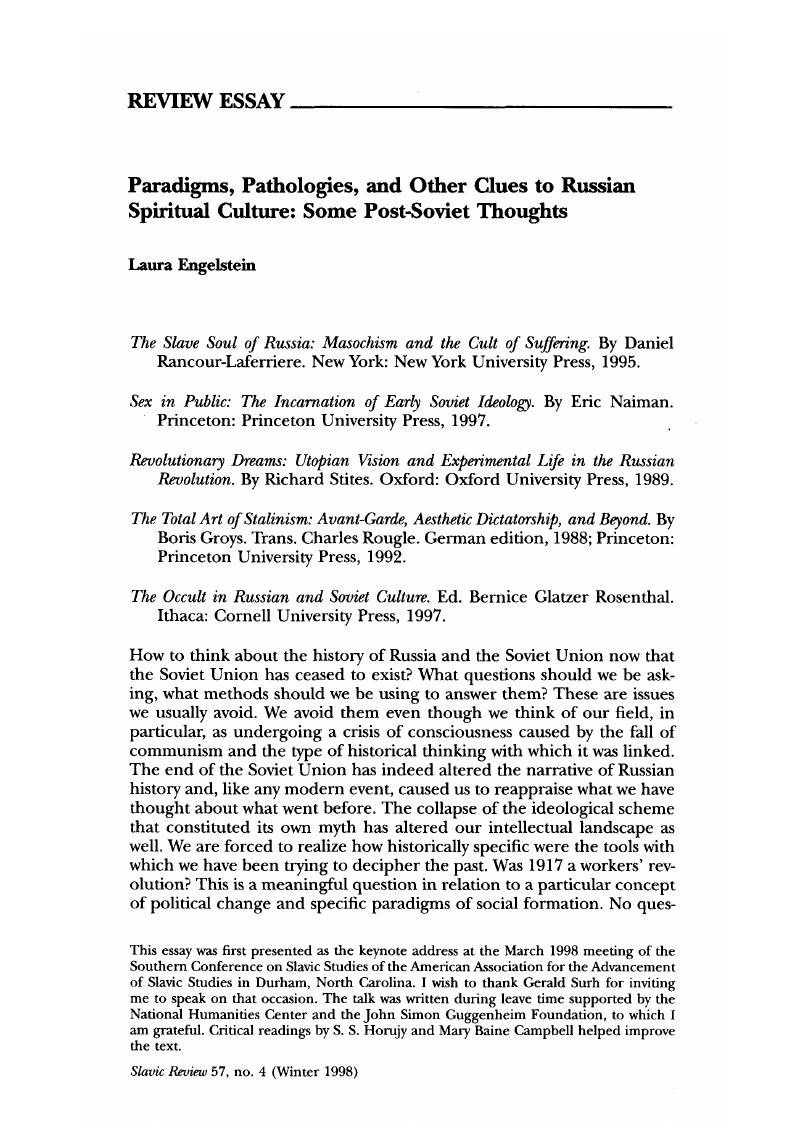Published online by Cambridge University Press: 27 January 2017

1. See Malia, Martin, “The End of the Noble Dream: How ‘Western Marxism’ Misread the Real Marx,” Times Literary Supplement, 7 November 1997, 20–22.Google Scholar
2. See Brooks, Jeffrey, When Russia Learned to Read: Literacy and Popular Literature, 1861–191 7 (Princeton, 1985)Google Scholar; Ransel, David L., Mothers of Misery: Child Abandonment in Russia (Princeton, 1988)Google Scholar; Zelnik, Reginald, Law and Disorder on the Narova River: The Kreenholm Strike of 1872 (Berkeley, 1995)Google Scholar; Paperno, Irina, Chernyshevsky and the Age of Realism: A Study in the Semiotics of Behavior (Stanford, 1988)Google Scholar; Stites, Richard, The Women's Liberation Movement in Russia: Feminism, Nihilism, and Bolshevism, 1860–1930 (Princeton, 1978)Google Scholar; Wagner, William G., Marriage, Property, and the Law in Late Imperial Russia (Oxford, 1994)CrossRefGoogle Scholar; Wortman, Richard, Scenarios of Power: Myth and Ceremony in Russian Monarchy (Princeton, 1995)Google Scholar; Kelly, Catriona and Shepherd, David, eds., Constructing Russian Culture in the Age of Revolution, 1881–1940 (Oxford, 1998).Google Scholar
3. Ingerflom, Claudio Sergio, “Communistes contre castrats (1929–1930): Les enjeux du conflit,” in Volkov, Nikolai, La secte russe des castrats, trans. Andreyev, Zoé, ed. Ingerflom, Claudio Sergio (Paris, 1995), xi–lxiii Google Scholar; Aleksandr Etkind, “Russkie skoptsy: Opyt istorii,” Zvezda, 1995, no.4: 131–63. These ideas are elaborated in Etkind, Aleksandr, Khlyst: Sekty, literatura i revoliutsiia (Moscow, 1998), pt. 1Google Scholar.
4. Ingerflom, “Communistes,” xv, xxvii, lxii. On the question of how archaic these forms really are, see Zhivov, Viktor, “Skoptsy v russkoi kul'ture: Po povodu knigi N. Volkova,” Novoe literatumoe obozrenie, 1996, no. 18: 396–400.Google Scholar
5. Etkind, “Russkie skoptsy,” 152.
6. Ibid., 148.
7. He situates his method in the context of current approaches, which include new historicism, deconstruction, discourse and intertexual analysis, Foucauldian “archaeology,” psychoanalysis, the sociology of religion, and feminism. See Etkind, Khlyst, 6.
8. Santner, Eric, Stranded Objects: Mourning, Meaning, and Film in Postwar Germany (Ithaca, 1990)Google Scholar, and Santner, , My Own Private Germany: Daniel Paul Schreber's Secret History of Modernity (Princeton, 1996)Google Scholar.
9. Etkind, “Russkie skoptsy,” 148.
10. Ibid., 140, 157. Etkind also associates the Skoptsy with Max Weber's Puritan ethic, crediting them with helping to build Russian capitalism (157). Since capitalism lost out to communism in the twentieth century, one might be forgiven for concluding from Etkind's work that repressed homosexuality was at the root of the Soviet system.
11. For a sensible discussion of cultural influence, see Ronald Vroon, “The Old Belief and Sectarianism as Cultural Models in the Silver Age,” Christianity and the Eastern Slavs, vol. 2, Russian Culture in Modern Times, ed. Robert P. Hughes and Irina Paperno (Berkeley, 1994), 172–90.
12. Etkind, Aleksandr, Sodom i psikheia: Ocherki intellektual'noi istorii Serebrianogo veka (Moscow, 1996), 90.Google Scholar
13. Etkind, Aleksandr, “Russkie sekty i sovetskii kommunizm: Proekt Vladimira Bonch-Bruevicha,” Minuvshee, 1996, no. 19: 309.Google Scholar
14. “Revoliutsiia kak kastratsiia “: Etkind, Sodom i psikheia, 59.
15. Fülöp-Miller, René, The Mind and Face of Bolshevism: An Examination of Cultural Life in Soviet Russia, trans. Flint, F. S. and Tait, D. F. (German ed., 1926; London, 1927)Google Scholar, cited by Etkind, Khlyst, 20.
16. Fülöp-Miller, Mind and Face, 85–86, 74, 75, 85.
17. Ibid., 71.
18. Bulgakov, Sergei, “Heroism and Asceticism: Reflections on the Religious Nature of the Russian Intelligentsia,” in Shatz, Marshall S. and Zimmerman, Judith E., trans, and eds., Vekhi: Landmarks (Armonk, N.Y., 1994), 17–49.Google Scholar
19. Stepun, Fedor, The Russian Soul and Revolution, trans. Huntress, Erminie (New York, 1935), 111–13.Google Scholar
20. Berdiaev, N. A., Russkaia ideia: Osnovnye problemy russkoi mysli XIX veka i nachala XX veka. Sud'ba Rossii (Moscow, 1997), 217–18Google Scholar. See McDaniel, Tim, The Agony of the Russian Idea (Princeton, 1996).Google Scholar
21. Berdiaev, Russkaia ideia, 214–15. All three writers are mentioned in Etkind, Khlyst, 20, 23–25. He also cites Norman Cohn's classic essay on this theme, The Pursuit of the Millennium (New York, 1957). Its changing subtitles reflect the context in which this idea evolved: Revolutionary Messianism in Medieval and Reformation Europe and Its Bearing on Modern Totalitarian Movements (New York, 1961); Revolutionary Millenarians and Mystical Anarchists of the Middle Ages (Oxford, 1970).
22. Rancour-Laferriere, Slave Soul of Russia, 7, 35.
23. Ibid., 5, 19, 2.
24. Naiman, Sex in Public, 23, 17, 4. See Etkind's positive review: Aleksandr Etkind, “Plot’ ideologii,” Novoe literaturnoe obozrenie, 1997, no. 28: 390–94.
25. Naiman, Sex in Public, 19, 18, 19, 5, 16.
26. Ibid., 25, 24.
27. Ibid., 26.
28. Ibid., 299.
29. Ibid., 12.
30. Klibanov, A. I., Narodnaia sotsial'naia utopiia v Rossii: Period feodalizma (Moscow, 1977).Google Scholar
31. This project has been the subject of other recent research. See Sarychev, V. A., Estetika russkogo modernizma: Problema “zhiznetvorchestva” (Voronezh, 1991)Google Scholar; Paperno, Irina and Grossman, Joan Delaney, eds., Creating Life: The Aesthetic Utopia of Russian Modernism (Stanford, 1994)Google Scholar; Evaniushina, I. Iu., Utopicheskoe soznanie v russkoi literature pervoi treti XX veka (Saratov, 1996).Google Scholar
32. Groys, Total Art, 36.
33. Ibid., 64.
34. Ibid., 70.
35. Ibid., 65.
36. Rosenthal, ed., Occult in Russian and Soviet Culture, 6, 12, 30, 394.
37. Ibid., 380.
38. Ibid., 18, 388, 390.
39. Ibid., 402, 404.
40. Ibid., 398–99.
41. Ibid., 411, 407.
42. Ibid., 418, 30.
43. Kaariainen, Kimmo and Furman, D. E., “Veruiushchie, ateisty i prochie (Evoliutsiia rossiiskoi religioznosti),” Voprosy filosofii, 1997, no. 6: 35–52.Google Scholar
44. Ibid., 44.
45. Ibid., 51.